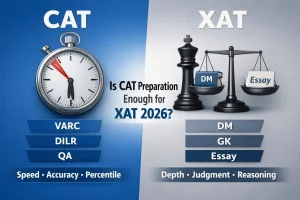Getting a Post Graduate Diploma in Management (PGDM) is a new way to learn, meet new people, and solve real-world challenges. But it is also one of the toughest programs to take in school because students have to manage lectures, homework, group projects, internships, and personal growth all at the same time. Most people find that time management is harder than mastering management ideas.
Time is the only thing that can’t be replaced. Knowing how to manage it can make the difference between a semester that is stressful and reactive and one that is productive and joyful. While the bad news is that the time available to you every day is finite, the excellent news is that managing your time doesn’t mean following rigorous schedules or not getting enough sleep. It has to do with setting priorities, staying focused, and making routines that help you work more efficiently.
Understanding the Challenge in PGDM for Students
Think about a PGDM student who has a lot to do in one day: a morning lecture, a discussion of a case study, a meeting for a team project, and a networking event in the evening. It’s late at night, and energy is running low. Without a plan, important work tends to get pushed back, which makes students feel stressed and overwhelmed. Taking charge of time management before things get out of hand is the only way out. It’s not about doing more; it’s about doing the right things quickly and well.
Hack 1: Make a plan for how to prioritise your tasks
Do the things that will give you the best results first. Some meetings, events, and assignments are better than others.
Start each week by writing out your key goals and breaking them down into daily tasks that you can do. Seeing deadlines helps you stay on track and avoid rushing at the last minute.
To figure out what genuinely helps you learn and grow, break your job into three groups: urgent, important, and optional.
Hack 2: Learn how to schedule things well
Set aside specific times for lectures, tasks, group discussions, and time alone. Think of these blocks as appointments that you can’t skip or move.
Leave short breaks between activities in case something goes wrong or something unexpected comes up. Being flexible keeps things going and keeps stress levels down.
Plan difficult chores for the times of day when you are most aware.
Hack 3: Using Tools and Technology to Your Advantage
Use electronic planners and calendars to keep track of all your deadlines, appointments, and reminders in one spot.
Another good way is to download Apps for managing group projects which can handle group projects, give out assignments, and keep track of their progress.
Focusing work time into blocks with regular breaks is one way to improve concentration and lower burnout.
Hack 4: Work together and give up control
To fulfil deadlines without putting too much work on anyone, divide up assignments based on each person’s strengths.
Talk to friends, mentors, or teachers about hard assignments. Delegation is a smart way to be more efficient, not a sign of weakness.
Hack 5: Don’t do more than one thing at a time.
To be efficient and do good work, do one thing at a time. Doing more than one thing at once makes you less productive and more likely to make mistakes.
Take breaks between jobs to clear your mind, improve your focus, and raise your creativity. Instead of mindlessly scrolling on your smartphones, use your breaks wisely.
Set goals that are clear, quantifiable, realistic, relevant, and have a deadline. Clear goals give you a sense of direction and make you responsible.
At the end of each week, look at what went well, what went wrong, and make any changes that need to be made. Keeping an eye on progress helps with discipline and growth.
Hack 6: Make sure your goals are clear and keep track of your progress.
Set goals that are clear, quantifiable, doable, important, and have a deadline. Clear goals give you direction and make you feel responsible.
At the conclusion of each week, look back at what worked and what didn’t, and change your strategy as needed. Keeping track of progress helps with discipline and improvement.
Hack 7: Keep a balance between work and life
Getting enough sleep, working out, and eating well are all important for being productive in the long run. A brain that is fatigued can’t keep track of time well.
To avoid burnout, make time for fun, socialising, and relaxing. A balanced regimen makes sure that you always do your best.
Conclusion
Time management is more about making choices on purpose, being disciplined, and making sure you know what’s most important and what is urgent! For PGDM students, it is the skill that turns stress into performance, confusion into clarity, and potential into success. Not doing everything is not the same as mastering time management. It means doing the right things at the right time all the time. With hard work, every student can succeed on the hard PGDM course road, which allows for study, networking, personal growth, and time to think. You can control how much time you have. If you use it wisely, it will pay out in ways that go beyond the classroom.






